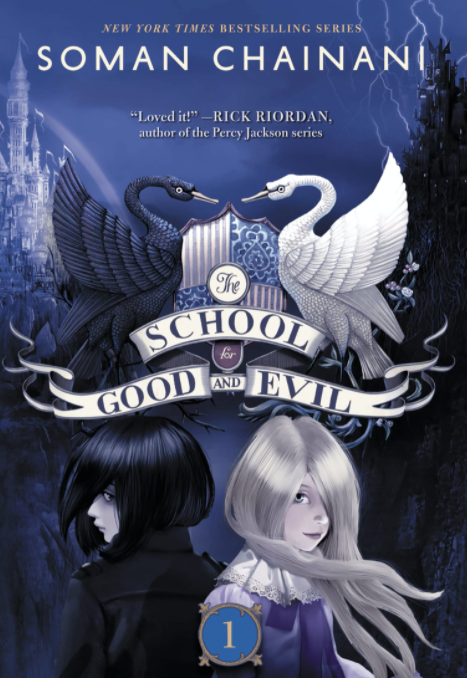How Author Soman Chainani’s Books Question the Nature of Good and Evil
Author Soman Chainani of “The School for Good and Evil” series talks about how his books question the nature of Good and Evil.
Soman Chainani, author of The School For Good and Evil series, didn’t think he would become a writer at first. He thought that he would become a professional tennis player. However, when Chainani was gifted Disney movies one Christmas, that began to change. By the time he headed off to college, Chainani had seen practically every Disney movie in existence, but he began to see predictable patterns in the films.
Chainani saw that Disney movies often told the same story again and again. He saw that they had the same classic protagonist characters that always overpowered the villains, even when it didn’t quite make sense. He saw stories where there was no middle ground between being good versus bad. Most of all, he always saw the same unrealistic story where only good can triumph. Setting out to change this, Chainani began to write a series that questioned what makes a person either good or evil.
Now a published author and filmmaker, Chainani is working on adapting this series to the big screen.
On Friday, March 19th, the Literature and Screenwriting Clubs held an event welcoming Chainani. The event consisted of Chainani’s presentation on what led him to become an author and a Q&A session during which the audience could ask questions about everything from combating writer’s block to finding one’s passion to filmmaking.
The School for Good and Evil series is set in a world controlled by good for the past 200 years. However, when Sophia and Agatha get kidnapped and are taken to either the School for Good or the School for Evil, in accordance with tradition, they accidentally switch places and are sent to each other’s intended schools – Agatha goes to The School for Good while Sophia goes to The School for Evil. Agatha, the stereotypical “evil” character, and Sophia, the stereotypical “good” character, help Chainani provide a base to explore themes regarding what makes a person good, what makes a person evil, and what creates the villain of a story. The School for Good and Evil questions the commonly accepted simplification of these traits by examining the meaning and definitions of morality.
“You can be a good person, you can have good intentions… but if you make the wrong choices, then you become the villain,” said Chainani during his presentation. In an explanation of the cruciality of both good and evil existing, Chainani said, “We need creators and we need destroyers because that’s how our world works. That’s what fairytales used to teach; that there was a balance between these. As soon as you try to pretend like that doesn’t exist, that good only looks one way, then you start to get into trouble because both sides then start to claim they’re good. When both sides start to claim they’re good, you lose complete balance once and for all.”
Most importantly, Chainani insists that one must not defeat the other. “We need creators and we need destroyers because that’s how our world works. That’s what fairytales used to teach; that there was a balance between these. As soon as you try to pretend like that doesn’t exist, that good only looks one way, then you start to get into trouble because both sides then start to claim they’re good. When both sides start to claim they’re good, you lose complete balance once and for all,” said Chainani.
Following the discussion of his novels, the conversation shifted to Chainani’s experiences as both a filmmaker and author. When asked about what it takes to be a writer and how to gain confidence to pursue writing as a career, Chainani responded with a set of questions that everyone should ask themselves, regardless of their passion:
“I think, ultimately what you have to consider for yourself is: Do you really believe in your stories and are the stories existential and essential to you as a person?” said Chainani, “Meaning, could you do another job? Because if you could do another job, you should probably do it. Writing to me is like a calling.”
Despite his vast experience finding inspiration, writing novels, and seeing his work successfully come together, Chainani, like most, has also encountered writer’s block. Chainani personally uses sports and exercise as a way to take a break from the writing process, scheduling his day to give him time to do both. Chainani finds this crucial to his routine and recommends to other writers finding activities that clear their minds, keeping them energized.
“I think it’s important for writers to have ways to get out of their heads. If you’re in your head, I think you end up writing stuff that tends to be quite incomprehensible and isn’t what you’re actually meaning. It’s a veiled version of what you’re trying to do,” said Chainani.
Chainani also suggests that one questions the reasons that writer’s block is occurring. Doing so could also address a deeper issue.
“Writer’s block means that, in my experience, you’re trying to force the story to the right. Not only is it not going to the right, it’s going to the left. So it just means you have to be more open,” said Chainani.
Throughout the event, Chainani answered more students’ questions and gave insightful advice on a wide variety of topics. Chainani shared his experiences of following his passions, becoming a writer, and in the process, inspired many.
“I think it’s important to really have that deep drive and knowing that you’re meant to be a writer first- or a creator. From there, everything can manifest itself.”

